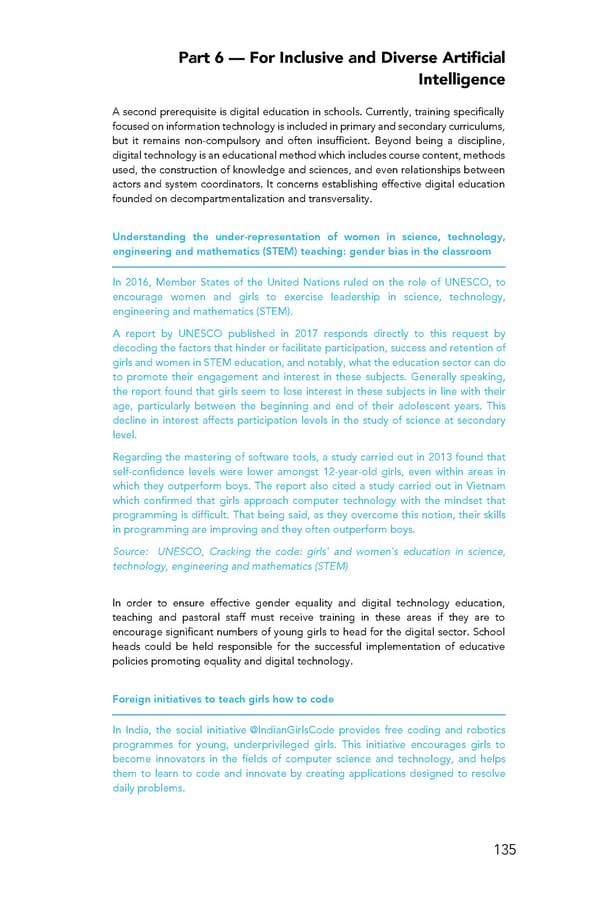Part 6 — For Inclusive and Diverse Artificial Intelligence A second prerequisite is digital education in schools. Currently, training specifically focused on information technology is included in primary and secondary curriculums, but it remains non-compulsory and often insufficient. Beyond being a discipline, digital technology is an educational method which includes course content, methods used, the construction of knowledge and sciences, and even relationships between actors and system coordinators. It concerns establishing effective digital education founded on decompartmentalization and transversality. Understanding the under-representation of women in science, technology, engineering and mathematics (STEM) teaching: gender bias in the classroom In 2016, Member States of the United Nations ruled on the role of UNESCO, to encourage women and girls to exercise leadership in science, technology, engineering and mathematics (STEM). A report by UNESCO published in 2017 responds directly to this request by decoding the factors that hinder or facilitate participation, success and retention of girls and women in STEM education, and notably, what the education sector can do to promote their engagement and interest in these subjects. Generally speaking, the report found that girls seem to lose interest in these subjects in line with their age, particularly between the beginning and end of their adolescent years. This decline in interest affects participation levels in the study of science at secondary level. Regarding the mastering of software tools, a study carried out in 2013 found that self-confidence levels were lower amongst 12-year-old girls, even within areas in which they outperform boys. The report also cited a study carried out in Vietnam which confirmed that girls approach computer technology with the mindset that programming is difficult. That being said, as they overcome this notion, their skills in programming are improving and they often outperform boys. Source: UNESCO, Cracking the code: girls' and women's education in science, technology, engineering and mathematics (STEM) In order to ensure effective gender equality and digital technology education, teaching and pastoral staff must receive training in these areas if they are to encourage significant numbers of young girls to head for the digital sector. School heads could be held responsible for the successful implementation of educative policies promoting equality and digital technology. Foreign initiatives to teach girls how to code In India, the social initiative @IndianGirlsCode provides free coding and robotics programmes for young, underprivileged girls. This initiative encourages girls to become innovators in the fields of computer science and technology, and helps them to learn to code and innovate by creating applications designed to resolve daily problems. 135
 For a Meaningful AI - Report Page 133 Page 135
For a Meaningful AI - Report Page 133 Page 135